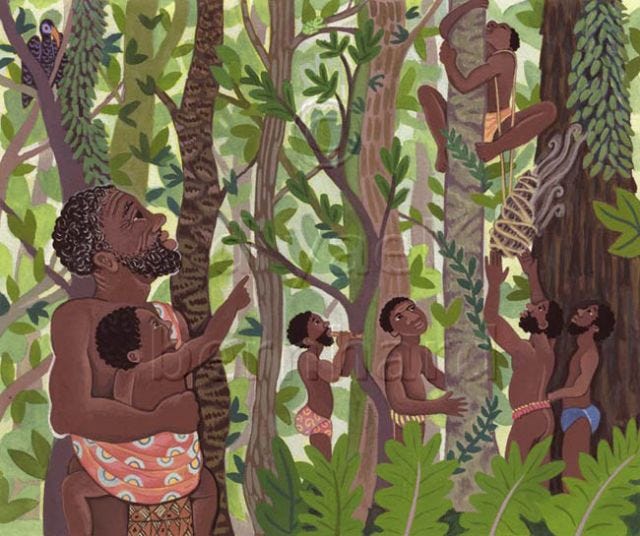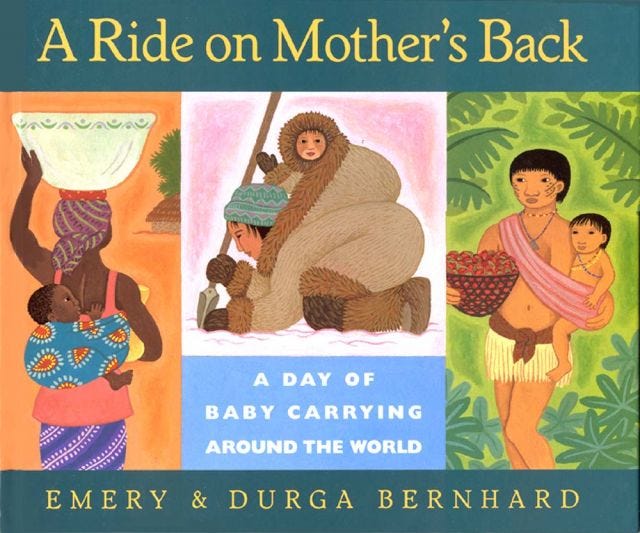Image of the Week: The Honey Flute

© D. Yael Bernhard
This picture book illustration from A Ride On Mother's Back (Harcourt Brace, 1996) shows a little boy being carried by his grandfather. His people, the Mbuti – a nomadic tribe of central Zaire – are employing a simple technique for locating and extracting honey from a beehive. First, the "honey flute" is played as a signal when the hive is found. Then one nimble man climbs the tree and draws a bundle of smoking branches up to the hive to smoke the bees out. Finally the honeycombs are lowered to the ground in baskets woven from leaves. Success is celebrated with more music from the honey flute.
Barefoot and almost naked, these diminutive people live in exquisite harmony with the forest that provides their every need. Honey is prized among the Mbuti not only for its sweet flavor and nutritional value, but also as a commodity for trading with the outside world. The African flute is played more as a rhythm instrument than a melodic one, with distinct phrasing that communicates specific messages over short distances. You can listen to Mbuti flute music here.
Every page in this book depicts a different culture. What they all have in common is that they carry their babies and toddlers on their bodies as they go about their daily lives. Each example is a window into the child's world, and what s/he learns while riding on the back, front, or side of their caregiver's body.
I designed and illustrated A Ride on Mother's Back in 1995, well before I had a computer or internet access. Extensive cultural research was required for each of the eleven cultures depicted, which I accomplished with the help of over fifty library books as well as several trips to New York City. There I visited historical museums, book stores, and the "picture collection" of the New York Public Library – a brick-and-mortar version of Google images, where instead of a search engine, a team of librarians searched their memories and wrote on scrap paper exactly which file – a physical object on a shelf – to look in to find the right photograph, postcard, newspaper clipping, or engraving. These pictures could be checked out with a library card or copied on a black-and-white Xerox machine for a dime apiece. I did the latter, and wrote color notes in the margin to help me illustrate subjects such as the kind of monkey that frequents the streets of Kathmandu; the tools used by the Inuit to chop holes in ice; the weave of a grass hut in Papua New Guinea; or the hornbill perched in the upper left corner of the above illustration.
To create the appearance of a jungle, I started with a background tinted pale grey to suggest a humid atmosphere. I gave the tree trunks very few branches, as most of the leafy boughs would spread out up in the canopy, out of sight. I mixed five shades of green, and randomly painted a medley of leafy shapes to create the effect of tangled foliage. The paler shades appear to recede into the forest. I gave some focused attention to the textures of the tree bark (after researching them), which are quite unlike North American trees. As you can imagine, this was all very time-consuming – but I don't think about that while I'm working, I just do what's needed until it's done. Kind of like raising a child – fulfill the need, and the child is happy. That's how attachment parenting works – the newfangled name for what these baby-carrying cultures are all about.
A Ride On Mother's Back caught on in the attachment parenting community here in the U.S., and the book has remained in print for 28 years – considerably longer than any other children's book I've published. In a world of plastic baby bottles and digital nursery monitors, it warms my heart to know there are parents out there who value raising a child in accord with nature's intentions – and the time-honored traditions shown in this book. For older readers, the back of the book contains more information about each culture.
I carried all three of my babies well into toddlerhood, and never used a crib, a pacifier, or bottles. My son was 7 years old and my older daughter was 4 when I illustrated this book. Their childhoods were the best years of my life.
You can order a signed copy of A Ride on Mother's Back here.

A good week to all!
D Yael Bernhard
http://dyaelbernhard.com
children's books • fine art • illustration
posters • cards • calendars



